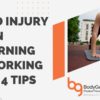1. Don’t Go “Just In Case.”
Called “JIC-ing,” this is something we learn as children when our parents worry about untimely requests to use the bathroom after leaving the house. As potty-trained adults, this is not something we should continue to practice.
There is an established signaling system between your bladder, your brain, and your pelvic floor. When you circumvent this system and decide you’re going to start calling the shots, then the whole system breaks down and no longer sends reliable signals.
Typically, the bladder will send three status reports. It sends the first signal when it’s about one-third full, just to let the brain know it’s starting to fill up. It’s best if most of the time you ignore this signal, but if on certain occasions you know you’re going to have limited access to a bathroom, wait for this signal before you “go just in case.” The second signal is sent when the bladder is about two-thirds full. This is when it’s time to start thinking about heading to the bathroom, but you usually still have a nice 10-30 minute window to leisurely make your way there. The last signal is that intense urge that makes you start squeezing your legs together and means your bladder is full and you need a bathroom now! Try to avoid making it to the third signal whenever possible.
Responding to the three signals appropriately will help to prevent and resolve issues with urinary urgency.
2. Don’t Hover.
It’s understandable to be concerned about germs on public toilets. However, the solution is not to hover over the toilet seat. Holding a squat like this makes it hard for your pelvic floor muscles to relax. As core muscles, part of their job is to activate to help you hold that squat position without falling over. When you’re peeing, you need the sphincter muscles that are part of the pelvic floor’s second layer to relax to allow urine to pass through. Sending mixed signals to your brain can make it harder to initiate urination or might make the pelvic floor sluggish to contribute to core stabilization during other activities.
3. Don’t Be Afraid of Peeing in Public.
Whether it’s the germs on the toilet seat or the thought of someone hearing your pee hit the water, there is a greater risk of developing a hyper-tonic pelvic floor if you hold your pee all day long. After a while, this can lead to pelvic pain, incontinence, or both. To combat the germs, use toilet paper or carry wet wipes to clean the seat, or use/bring toilet seat covers. If you’re worried about the person next to you, worry more about the health of your bladder and pelvic floor. If you have a genuine phobia, speak with someone you trust or a professional to help you develop strategies to overcome your anxiety.
4. Don’t Speed Things Up.
Those staying home alone with young children might find themselves forcing the urine out as quickly as possible to spend a minimum amount of time in the bathroom for fear of emerging to find the kitchen covered in peanut butter or some other chaos. Over time, this could lead to difficulty naturally initiating urination without pushing, something people commonly seek out pelvic floor physical therapy to treat.
5. Don’t Irritate Your Bladder.
Increased urinary urgency and/or frequency can be the result of consuming too many bladder irritants. You might have experienced “breaking the seal” while drinking alcohol—the bladder continuing to tell you it’s full but really just wanting to get rid of the alcohol irritating its lining. Other bladder irritants include carbonated drinks (even sparkling water), caffeine, spicy food, ketchup, chocolate, strawberries, apple cider vinegar, and citrus. You don’t need to eliminate all these things from your diet; you might just need to experiment to find what combinations and quantities you can tolerate.
You have questions. We have answers about the health of your pelvic floor.
For more information or to discuss any questions you have about our pelvic health program, please contact one of our pelvic health experts. You can also Request Free Consult at any one of our Body Gears Centers.






